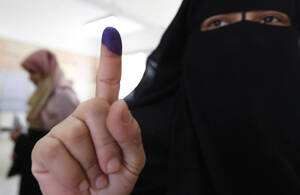Egyptian Christians voting in their nation’s historic presidential election were throwing much of their support behind candidates who aimed to check the power of the Islamist parties. Although no official statistics on the Christian vote were reported, in the days before and during the election on May 23-24, many of Egypt’s Christians said they would support candidates who served under ousted President Hosni Mubarak, worried that the ideals of the 2011 revolution might have been too ambitious.
“For me as a Christian I have only a few choices—the other side is Islamic, I can’t choose them,” said a man identified only as Rami, 45, a worshiper at the Catholic basilica in Cairo’s Heliopolis district. It appeared that many Christians supported former Prime Minister Ahmed Shafik or former Foreign Minister Amr Moussa, who also served as secretary general of the Arab League for 10 years. “Even if Shafik and Moussa are from the old regime,” Rami said, “they offer security and freedom to live the way we want.”
No one was the outright victor in the first round of presidential elections. A run-off for Egypt’s first freely elected president has been scheduled on June 16-17 between Mohamed Morsi, the Muslim Brotherhood candidate, and Shafik.
A senior church leader in Egypt has expressed grave doubts about the prospects for Christians if the Muslim Brotherhood emerges victorious in June. Antonios Aziz Mina, the Coptic Catholic bishop of Guizeh, said that while it was difficult to say which candidate would best guarantee liberty for the country’s Christians, he had fears about the Muslim Brotherhood taking power.
Bishop Aziz said: “The Muslim Brothers say one thing; then tomorrow they do another thing. They don’t maintain their promises; that’s the problem.” He added that it would be difficult to vote for the Muslim Brotherhood without guarantees from them. “Whoever will guarantee liberty and democracy and a good constitution for Egypt will have our vote,” said Bishop Aziz.
The Rev. Sherif Nashef, assistant pastor at the Melkite Catholic Church of St. Cyril, explained that the nation’s Christian minority has been forced into pragmatism at the ballot box. “When people see a man like Shafiq in power they will feel comfortable. They feel their country is in safe hands,” he said, summing up the grudging support for figures associated with Mubarak’s regime, which suppressed political Islamism in an often-brutal manner.
“Shafiq may be supported by the army if he is in power; they will keep us safe,” said a woman identified only as Ines, a 39-year-old accountant attending the Maronite Catholic Church in Heliopolis. “In the beginning we were with the revolution, but after all that has happened, we are against [it]. Nothing has changed for the better.
“Under Shafiq, at least we will be back as we were,” Ines said. “That’s enough.”








